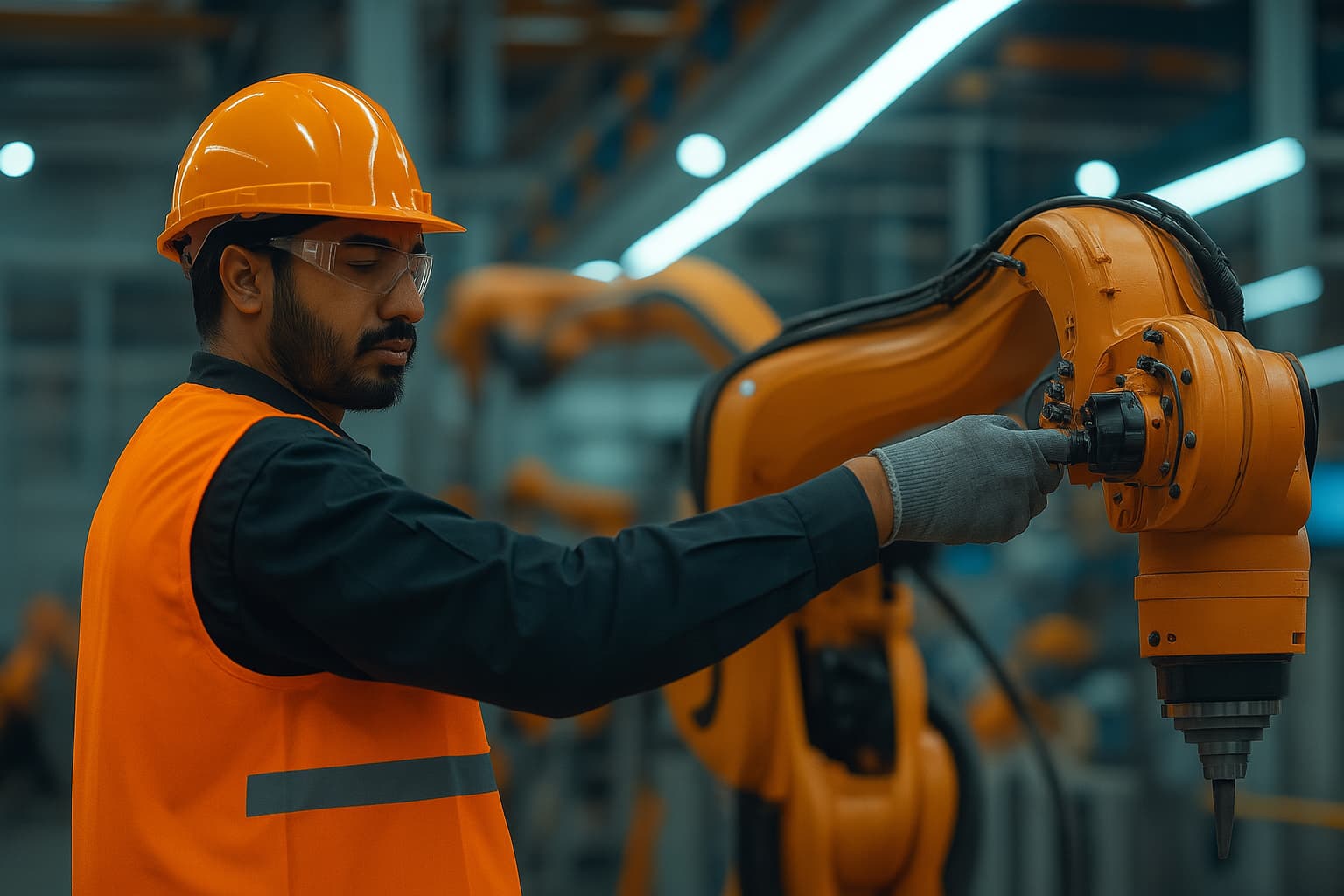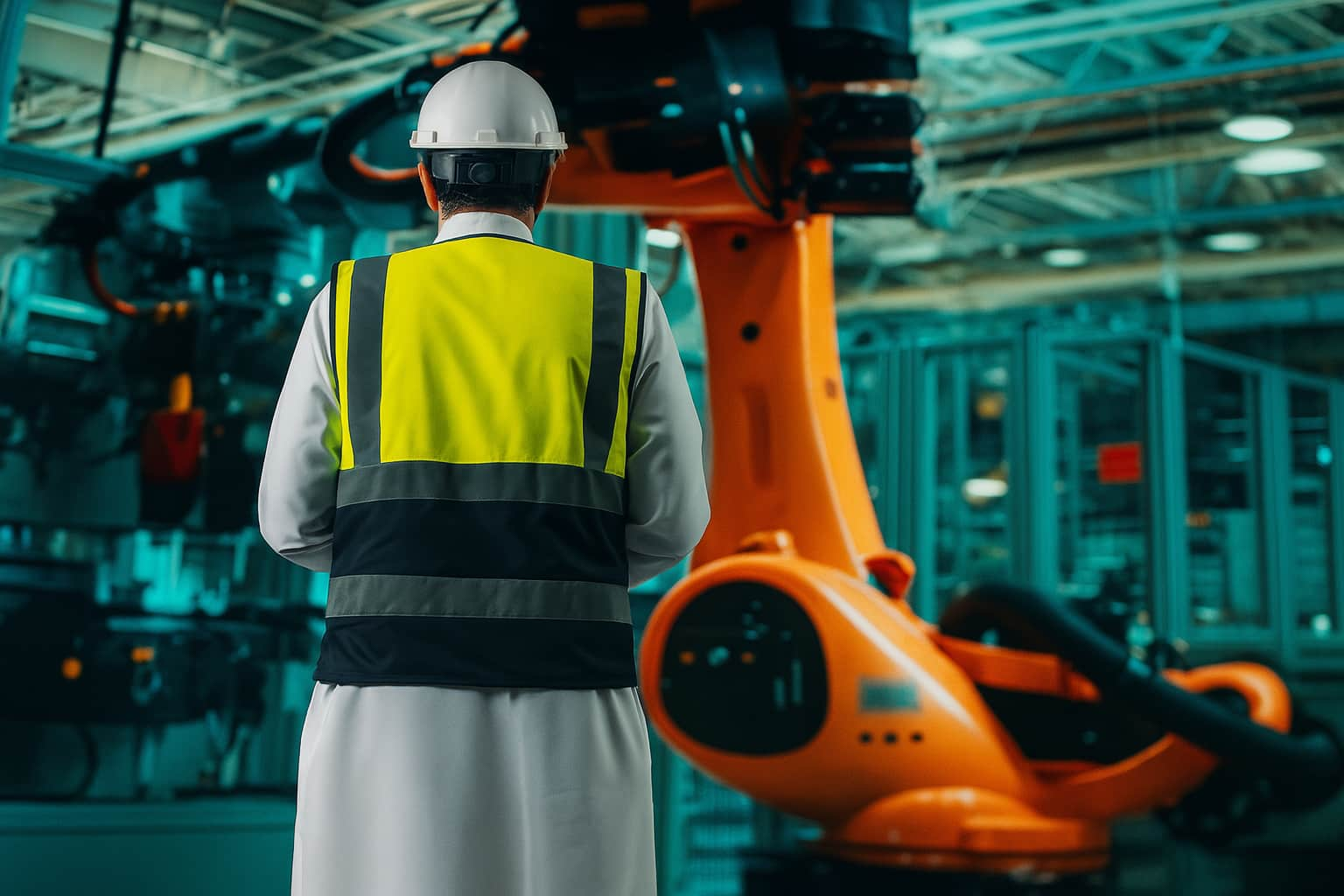Industrial licensing in Saudi Arabia plays a key role in the Kingdom’s vision for economic growth and diversification. As manufacturing, logistics, and local production become national priorities under Vision 2030.
Industrial License in Saudi Arabia: Role, Vision 2030 Impact & Strategic Growth
An industrial license is mandatory authorization for companies engaging in manufacturing or processing goods in Saudi Arabia. It legitimizes factory operations and unlocks access to favorable incentives and infrastructure.
Especially under national initiatives focused on industrial expansion, the license is a critical gateway for both local and foreign investors.

What Is an Industrial License?
An industrial license allows firms to set up factories or production facilities and operate legally within Saudi Arabia’s manufacturing sector.
It is issued in preliminary form for project planning and facility allocation, and finalized once construction and compliance checks are complete.
Having this license ensures factories meet local production, safety, and environmental standards, and qualifies businesses for targeted industrial benefits.
Strategic Importance under Vision 2030
The industrial license is a core element of Vision 2030’s economic diversification strategy.
Saudi Arabia plans to triple industrial investments, create high-skilled jobs, and reduce reliance on oil revenue by rapidly expanding its industrial base from petrochemicals to food processing, automotive parts, and renewable tech.
Licensing plays a central role in enabling this transformation by promoting compliance, innovation, and local production standards across emerging sectors.
Types of Industrial Licenses
Saudi Arabia offers tailored license types depending on production scale:
- Heavy Industry License: For capital-intensive manufacturing and large-scale factories.
- Light Industry License: Suits SMEs and small-scale product lines.
- Transformative Industry License: Applicable to firms processing raw materials into higher-value outputs.
Who Needs One and Who Is Exempt?
Any business engaged in manufacturing, assembling, packaging, or processing goods must hold this license. Sole proprietorships or firms with limited industrial activity may be exempt especially if annual capital or production thresholds are not met.
Licensing Authorities and Role Allocation
Industrial licenses are issued by the Ministry of Industry and Mineral Resources (MIMR). Applications must also pass reviews by environmental agencies, civil defense teams, and municipal authorities.
Industrial cities overseen by MODON provide land and infrastructure, along with integration into specialized zones.
Eligibility & 100% Foreign Ownership
Foreign investors can fully own licensed manufacturing businesses if their intended operations align with national industrial goals.
Foreign companies must submit a feasibility report, capital plan, and workforce strategies that meet localization requirements (e.g. Saudization).
Required Documentation & Feasibility Study
Applicants must provide:
- Corporate documents (Commercial Registration, shareholder details)
- Feasibility study outlining production, financial forecast, and economic impact
- Factory site plans and architectural layouts
- Environment and safety approvals
- Workforce plan including Saudization metrics
Application Process & Timeline
Licensing involves two phases:
- Preliminary license issued for project planning, site allocation, and equipment import.
- Final license granted once design, safety inspections, and regulatory compliance are verified.
The entire review process typically ranges from 5 to 30 working days, depending on application completeness and sector review speed.
Post-License Obligations & Renewal
Industrial facilities must:
- Submit regular production and employment data
- Renew licenses every three to five years
- Maintain environmental, safety, and Saudization compliance
- Undergo inspections by relevant authorities to continue operations
Read Also About: Starting a Company in Saudi Arabia: Complete Setup Guide

Benefits & Government Incentives
Industrial license holders can access:
- Customs exemptions on machinery and raw materials
- Preferential land rates in industrial cities
- Energy subsidies or allocation support
- Access to finance via national funds such as SIDF
- Priority procurement opportunities in public projects
Industrial Cluster & Infrastructure Support
Saudi Arabia operates major industrial hubs like Jubail and Riyadh industrial cities equipped with utilities, transport, and trade access.
These zones are essential for manufacturers seeking integrated infrastructure and scalability. The goal is to host 36,000 factories by 2035, supported by high-speed logistics and sector-specific clusters.
Industrial licensing is not just regulatory red tape it’s a strategic enabler for economic transformation.
Under Vision 2030, manufacturing growth aligns with national goals in job creation, local content, export promotion, and technology transfer. Navigating licensing effectively accelerates your business journey in Saudi Arabia.
Looking to secure your industrial license in Saudi Arabia? Motaded simplifies the process guiding you through every regulatory step, from eligibility to approvals, so you can focus on production.
Types of Industrial Licenses and Their Strategic Value in Saudi Arabia
Industrial licensing in Saudi Arabia plays a central role in shaping the future of the Kingdom’s manufacturing landscape.
With Vision 2030 targeting diversification and industrial growth, understanding the types of industrial licenses and their associated benefits has become crucial for both local and international investors.
Whether launching a heavy manufacturing plant or a light assembly operation, selecting the appropriate license sets the foundation for successful market entry and long-term scalability.
Each license category caters to distinct business models and scales. Understanding the strategic benefits of each option and aligning your choice with your growth goals is essential to unlocking the full potential of the pro-industry ecosystem.
For investors and entrepreneurs aiming to tap into one of the fastest-growing industrial markets in the region, now is the time to take action.
The licensing framework, backed by Vision 2030’s ambitious targets, is designed to attract innovation, technology, and sustainable development.
Heavy Industry License
This category targets operations requiring substantial capital investment and large-scale infrastructure. Companies that fall under this license typically include steel factories, chemical refineries, and advanced equipment production lines.
These projects involve significant environmental compliance, feasibility assessments, and workforce planning. Government authorities often evaluate long-term value contribution and alignment with national development goals before issuing such licenses.
Light Industry License
This license is intended for smaller-scale operations such as food processing, clothing manufacturing, or electronics assembly. Capital requirements are modest compared to heavy industry.
Regulatory procedures are more streamlined, making it attractive to small and medium-sized enterprises aiming to launch without complex industrial overheads. It is particularly suitable for businesses that focus on local supply or limited export.
Transformative Industry License
Transformative licenses are tailored for businesses that add value by converting raw or semi-finished materials into final consumer or industrial products. These may include sectors such as plastics, packaging, furniture, and industrial parts.
The emphasis is on processing rather than extraction or assembly. This license bridges the gap between heavy and light industries and supports innovation in product development.
Benefits and Incentives for Licensed Industrial Businesses
Industrial licenses in Saudi Arabia come with tangible advantages that help businesses grow efficiently and reduce operational barriers.
Access to Tax Incentives
Companies with valid industrial licenses may be eligible for reduced corporate tax rates and relief on indirect taxes like VAT or customs duties. These benefits are particularly helpful for manufacturers serving regional or international markets.
Subsidized Land and Utilities
Licensed businesses operating in designated industrial zones can obtain land and essential utilities at preferential rates.
These areas are equipped with infrastructure designed to support heavy and light manufacturing activities, which reduces setup costs and facilitates faster project rollouts.
Priority in Government Projects
Holding a valid industrial license enhances a company’s credibility and makes it more competitive when bidding for large contracts, especially those funded or sponsored by government entities. It also builds trust with potential clients and partners.
Access to Government-Backed Financing
Several government-backed financial institutions provide tailored loans for licensed manufacturers. Depending on project scale and strategic alignment, businesses can secure funding for machinery, expansion, or export activities.
Streamlined Support Services
Licensed companies often benefit from faster access to business support resources, investor centers, and regulatory facilitation. Dedicated service desks handle industrial queries, speeding up approval times and easing compliance burdens.
Preferential Financing and Training Support
Organizations such as the Saudi Industrial Development Fund offer low-interest loans covering a large portion of project costs. Training programs may also subsidize hiring Saudi nationals, driving Saudization goals
Choosing the Right License for Your Business
Your choice of industrial license should align with your business model, capital capability, and production goals:
- Use a Heavy Industry License for high-capital projects and large-scale output.
- Choose a Light Industry License for compact, cost-effective manufacturing.
- Opt for a Transformative Industry License if your business adds value through material transformation.
Selecting the appropriate category ensures smoother application, quicker approval, and optimal use of state support services.
Application Process: What to Expect
Getting an industrial license in Saudi Arabia follows a defined sequence:
- Determine the Right License Type: Match your operations to heavy, light, or transformative categories.
- Prepare Documentation: Feasibility study, environmental impact assessment, facility layout, equipment list, and workforce plan.
- Submit to the Ministry of Industry: Initial review assesses strategic fit and compliance.
- Obtain Preliminary Approval: This allows for facility setup, equipment import, and preliminary hiring.
- Undergo Final Inspection: Authorities verify readiness, safety standards, and staffing levels.
- Receive Final Industrial License: Operations can commence fully, with access to associated benefits.
Vision 2030 and Industrial Licensing
Saudi Arabia’s economic blueprint emphasizes industrialization as a core growth engine.
Through specialized licensing, the country aims to attract foreign manufacturers, empower local production, and reduce reliance on imports. The national plan specifically promotes sectors like:
- Renewable energy equipment
- Industrial machinery and automation
- Food and beverage production
- Automotive components
- Advanced materials and packaging
This makes industrial licensing not just a legal requirement but a strategic tool for tapping into state-backed growth opportunities.
Choosing the right industrial license is more than a compliance step; it's a business strategy.
Whether you're entering the Saudi market with a high-capacity plant or launching a value-added transformation line, aligning your license with your business model gives you the best chance at long-term success.
With tax relief, infrastructure incentives, and access to financing, industrial licenses unlock a range of competitive advantages that few other markets offer today.
Industrial licensing in Saudi Arabia isn’t just a regulatory formality, it's the gateway to a host of government-backed advantages, from tax relief and subsidized infrastructure to eligibility for national contracts and priority investor services.
Whether you’re planning a high-investment manufacturing plant, a specialized processing line, or a scalable light production facility, selecting the right license ensures operational efficiency and long-term success.
Start your manufacturing journey in Saudi Arabia with confidence. Motaded handles the complexities of industrial licensing, ensuring you're compliant, approved, and ready to operate without delays.

FAQs about industrial license saudi arabia
What exactly is an industrial license in Saudi Arabia?
An industrial license authorizes businesses to establish factories or production facilities in Saudi Arabia and engage in manufacturing or transformative activities. It’s essential for legal operation in industrial sectors.
Who must apply for an industrial license?
Any entity involved in the manufacturing or processing of goods whether in heavy, light, or transformative sectors must secure this license. Sole proprietorships and single-person companies are excluded.
What kinds of industrial licenses are available?
There are three main categories: heavy industry (high capital-intensive), light industry (smaller-scale production), and transformative industry (processing raw inputs into finished products).
What post-approval obligations apply?
License holders must submit periodic production reports, maintain staff Saudization ratios, uphold safety standards, and renew their license every three to five years to remain compliant.
Are there incentives for industrial license holders?
Yes. Industrial licensees can benefit from customs duty exemptions, subsidized land costs in designated industrial zones, technical support, and access to government procurement projects.
Can the license be used for export purposes?
Absolutely. It permits both domestic manufacturing and export of goods. Many licensees use it to sell products internationally and benefit from investment-driven incentives.
What happens if an industrial license lapses?
Lapsed licenses may trigger facility inspections, fines, compliance flags, and loss of access to customs or government contracts. Renewal is essential to remain operational
Where can investors get expert assistance?
Specialist firms like Our Agency streamline the process from document preparation and feasibility to submission and follow-up reducing application delays and compliance risks.
How can I ensure a smooth process for obtaining an industrial license in Saudi Arabia?
Partnering with a local expert like Motaded helps streamline every step from preparing documents to handling government submissions ensuring your license process remains efficient, compliant, and hassle-free. Contact Now.